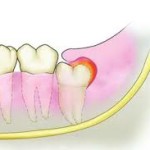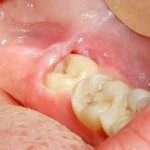Pericorinitis is the inflamation of gingival tissue around the erupting molars (usually the 3rd molars or wisdom teeth). It happens when there is not enough space to allow the tooth to fully erupt and the back half of it is trapped underneath a sheath of covering gum tissue. This creates a haven for bacteria to accumulate and cause infection. Pericoronitis can cause severe pain, difficulties swallowing, inability to open mouth and malaise. Treatments are administration of antibiotics and surgical extractions of the involved teeth.
What Are the Symptoms of Pericoronitis :
- Pain
- Infection
- Swelling in the gum tissue (caused by an accumulation of fluid)
- A “bad taste” in the mouth (caused by pus leaking from the gums)
- Swelling of the lymph nodes in the neck
- Difficulty opening the mouth
How Is Pericoronitis Treated?
If the pericoronitis is limited to the tooth (for example, if the pain and swelling has not spread), treat it by rinsing your mouth with warm salt water. You should also make sure that the gum flap has no food trapped under it.
If your tooth, jaw, and cheek are swollen and painful, see your dentist right away. He or she can treat the infection with antibiotics (usually penicillin, unless you are allergic). You can also take pain relievers such as aspirin, acetaminophen, or ibuprofen. The dentist may also prescribe a pain medication.
If the pain and inflammation are severe, or if the pericoronitis recurs, it may be necessary to have oral surgery to remove the gum flap or wisdom tooth. Your dentist can make the appropriate referral to the oral and maxillofacial surgeon. A low-level laser can be used to reduce pain and inflammation associated with pericoronitis.

